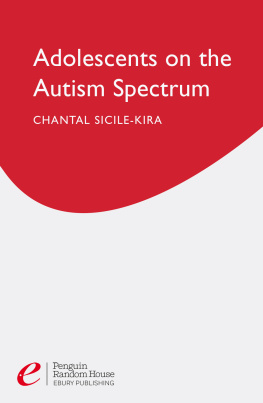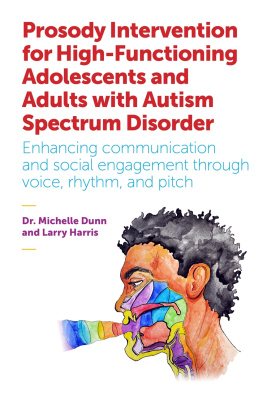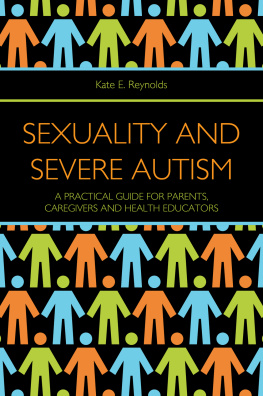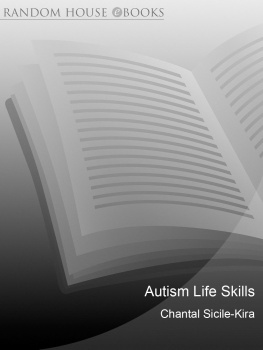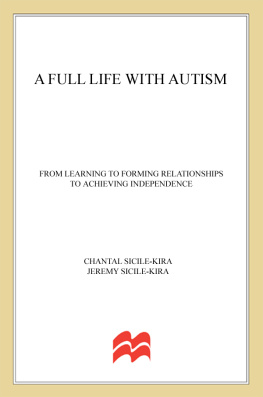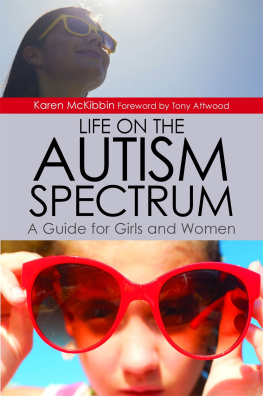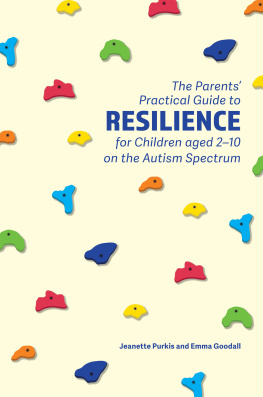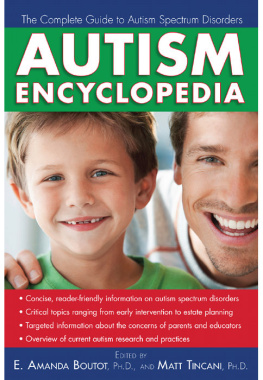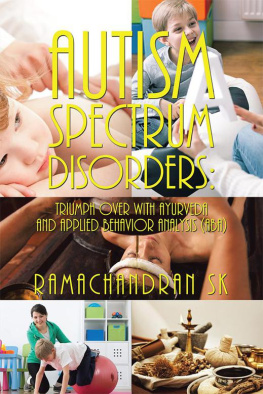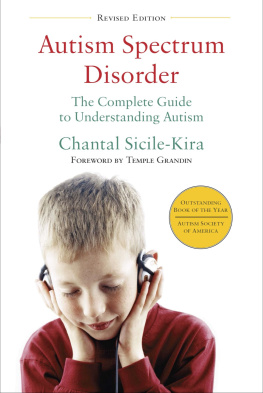CONTENTS
Adolescents on the Autism Spectrum
Chantal Sicile-Kira

This ebook is copyright material and must not be copied, reproduced, transferred, distributed, leased, licensed or publicly performed or used in any way except as specifically permitted in writing by the publishers, as allowed under the terms and conditions under which it was purchased or as strictly permitted by applicable copyright law. Any unauthorized distribution or use of this text may be a direct infringement of the authors and publishers rights and those responsible may be liable in law accordingly.
Epub ISBN 9781473527720
Version 1.0
1 3 5 7 9 10 8 6 4 2
Vermilion, an imprint of Ebury Publishing,
20 Vauxhall Bridge Road,
London SWIV 2SA
Vermilion is part of the Penguin Random House group of companies whose addresses can be found at global.penguinrandomhouse.com
Copyright Chantal Sicile-Kira 2006
Chantal Sicile-Kira has asserted her moral right to be identified as the author of this Work in accordance with the Copyright, Design and Patents Act 1988.
First published in the United States in 2006 by The Berkeley Publishing Group,
Penguin Group (USA) Inc.
First published in the United Kingdom in 2007 by Vermilion
www.eburypublishing.co.uk
A CIP catalogue record is available for this book from the British Library.
ISBN: 9780091912963
For Dr Bernard Rimland
You must be the change you wish to see in the world.
Mahatma Gandhi
The responsibility to help current and future generations of children with autism and Aspergers syndrome develop their strengths in order to lead meaningful lives in our society belongs to all of us. That includes people on or near the spectrum, family members, teachers and anyone who comes in contact with people with autism and Aspergers syndrome.
Stephen Shore, Beyond the Wall
ACKNOWLEDGEMENTS
Although the author is the one who sits down and does the writing day in and day out, a book such as this could not exist without the help, support, encouragement and expertise of many people.
Thanks go to Imogen Fortes, my editor, as well as to Margaret Gilbey for translating my American into proper English. Thanks to Jim Levine, my agent, for his continual support and mentoring, and Debra Ginsberg and Douglas Kennedy (fellow authors) for their pearls of wisdom.
Once again, I am indebted to Temple Grandin, Ph.D., associate professor of Animal Science at Colorado State University and author of Thinking in Pictures, Developing Talents and Animals in Translation, as well as Bernard Rimland, Ph.D., founder and director of the Autism Research Institute, for being generous with their time and expertise. Thanks as well goes to Dr Cathy Pratt, Director of the Indiana Resource Center for Autism, and chair of the National Autism Society of America; and to Cathy Mercer of the National Autistic Society.
Many thanks to The Schafer Report and Autism One Radio for being places where parents and professionals, no matter where they are, can daily access the latest information about autism spectrum disorders and all its complexities. Knowledge is empowerment.
No man is an island, and if wealth were judged by the number of true friends a person had, I would be considered very rich indeed. I thank all my friends and family on both sides of the Atlantic and on both coasts for their enduring friendship over many years. They know who they are, and I do not want to list them all for fear of inadvertently leaving someone out.
Raising a child like Jeremy cannot be done alone. Thanks to the educators, afternoon angels and all others who have been there for Jeremy and our family.
Last but not least, thanks to Jeremy, Rebecca and Daniel for their patience and understanding while I was in book mode. It was much appreciated.
FOREWORD
A little while ago, George, the elder of my two autistic sons, was obsessed with visiting the supermarket. Motivation is a rare and valuable commodity in Georges aimless world; seizing the opportunity to exploit his desire for educational purposes, I told him that we could go to the supermarket if he wrote a shopping list first. He took a piece of paper and wrote LIST at the top, heavily underlined. Underneath he wrote I will see when I get there, and that was all.
Parents of autistic children are often asked about the future: What will happen when s/he reaches adolescence/leaves school/cant be managed at home any longer? For most of us, I will see when I get there is the only honest answer. Despite a huge increase in research and awareness in recent years, autism remains a mysterious condition. Its hard to plan for your childs future when throughout his life his development has been so erratic, with spurts of unexpected progress mixed with backsliding into periods of withdrawal when it seems hes not learning anything at all. Ive spoken to many older parents who have been amazed and delighted by the transformation that has taken place once their sons or daughters reach maturity. But Ive also come across plenty of cases where the child, once apparently gifted and full of joie de vivre, has become a dependent, routine-bound, intensely anxious adult. The only predictable element of an autistic childs development is that it will in no way resemble that of his neurotypical peers.
One thing is certain autism doesnt just go away. The forms in which it manifests itself may change dramatically, but to search for a cure is pointless. An autistic child becomes an autistic adult, even if as in a small minority of cases the autism is so well managed that a normal life is possible. Everyone who cares for an autistic child parent, guardian, teacher, whoever needs to accept that the condition is profound, and permanent.
Accepting that a cure is neither possible nor desirable doesnt mean giving up on any hope of improvement far from it. One of the great strengths of Chantal Sicile-Kiras book is that it is written by someone who, as a parent and as a professional, never gives up trying. In the twenty years of her professional experience, Chantal has been in contact with autistic people all over America, and has witnessed astonishing, inspiring changes in many lives. Most movingly, she has made every effort on behalf of her own autistic son Jeremy, and she has seen her efforts bear fruit. She has a vision of a society in which autistic people are able to live fulfilling, meaningful lives, and her conviction is infectious.
Even now, we hear and see a lot about autistic children in the media; much less about autistic adults. The adults we do read about are those with savant skills, often in music, art or mathematics, or those with the ability to write or speak about their own lives, but these amount to only a fraction of the total. The majority of autists have no outstanding savant skill, and most have little perspective on or understanding of their own condition. Though autists share the same triad of impairments of communication, interaction, and social imagination they are also individuals, each with a unique set of characteristics, likes and dislikes. My two autistic sons George and Sam are at least as different from each other as either of them is from their younger neurotypical brother Jake. One thing they all have in common, however, is that adolescence will change bring change and upheaval. Adolescence is a tricky subject even under normal circumstances, but change is inevitable, and Chantal Sicile-Kira has done an excellent job in helping special needs parents to face the facts. She does not flinch from discussing personal hygiene, puberty, sexuality, challenging behaviours she sets out to provide honest answers to the questions that many parents are afraid to ask.
Next page
